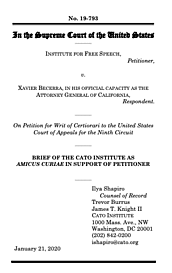In 2010, the California attorney general’s office began demanding that all nonprofit organizations fundraising in the state turn over their IRS Form 990 Schedule B. A “Schedule B” is a highly confidential IRS form that lists the names and addresses of an organization’s major donors—including those who live outside of California. Although the attorney general’s office claimed that it would keep Schedule Bs private, systematic incompetence and a lack of procedural and technical safeguards have led to repeated and widespread leaks of the documents to the public.
In order to protect the privacy of their donors, several organizations challenged the disclosure requirement in federal court as a violation of the right to association anonymously, which the Supreme Court has recognized on many occasions. Unfortunately, the Ninth Circuit repeatedly went against decades of Supreme Court precedent by applying lessened forms of First Amendment protection. In particular, the court has refused to apply what is known as “narrow tailoring.” “Narrow tailoring” is a common‐sense requirement that the government carefully craft laws so that they infringe as little as possible on fundamental rights.
Several lawsuits challenging California’s disclosure requirement have now reached the Supreme Court. In September, Cato filed a brief in support of two organizations behind the challenges, Americans for Prosperity Foundation (AFP) and the Thomas More Law Center. Their cases have drawn considerable attention—over twenty organizations besides Cato have filed amicus briefs in one or both cases.
Now Cato has filed a brief in support of a third challenger, the Institute for Free Speech (IFS). Like AFP and Thomas More, IFS is a nonprofit organization that engages in non-electoral advocacy, in support of which it solicits private donations from like-minded individuals across the country. Many of IFS’s donors prefer to remain anonymous for fear of public reprisal. Accordingly, IFS has chosen to cease soliciting contributions in California rather than compromise its donors’ privacy.
The right to privacy in one’s associations is well-established in Supreme Court doctrine going back to the Civil Rights Era. During that era, the narrow-tailoring requirement that the Ninth Circuit has refused to apply here was repeatedly used to prevent southern states from forcing the NAACP to disclose its membership lists. Since then, the Court has adhered to the position that privacy and anonymity in a person’s associations are of the utmost importance to First Amendment freedoms. Without these protections, the risk of social, economic, and physical consequences chills free association and expression.
Recently, donors and activists across the political spectrum have faced threats, harassment, boycotts, and violence because of their political views and activities. Unlike AFP and Thomas More, IFS had its case prematurely dismissed by the federal district court without the benefit of discovery or trial. As a result, IFS lacked the opportunity to put before the court any threats, harassment, or boycotts its donors have received or would likely receive if it complied with California’s demand. Contrary to the Ninth Circuit’s assertion otherwise, however, showing such severe consequences is not required under First Amendment doctrine—nor should it be.
In today’s polarizing political environment, it is imperative that the First Amendment’s protections for anonymous expression and association be vigorously protected. Instead, the Ninth Circuit mischaracterized the Supreme Court’s jurisprudence as only protecting anonymous association in rare circumstances. For this reason, we have asked the Court to take this opportunity to clarify its First Amendment precedents, including the requirement that all laws infringing on First Amendment freedoms be narrowly tailored.




